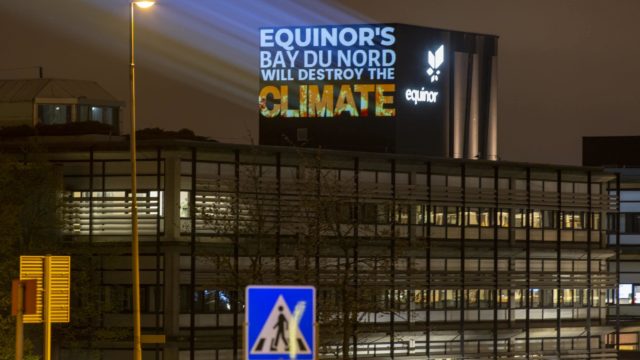Environmental and Indigenous groups share announcement on the heels of global climate strikes
ST JOHN’S, N.L./TRADITIONAL TERRITORY OF THE BEOTHUK AND MI’KMAQ — Environmental and Indigenous groups are continuing their legal challenge of the Minister of Environment and Climate Change’s decision to approve Bay du Nord after the Federal Court dismissed their case in June.
On Friday, Ecojustice filed an appeal to the Federal Court of Appeal on behalf of Sierra Club Canada Foundation and Mi’gmawe’l Tplu’taqnn Incorporated (MTI). The announcement comes amidst a groundswell of momentum generated by the Global Climate Strike. Over the past three days, millions of people around the world took to the streets to demand a rapid, just, and equitable end to fossil fuels.
Bay du Nord is a $16-billion oil and gas megaproject proposed off the coast of Newfoundland and Labrador. The project has been mired in controversy since it was first approved by the Liberal government in April 2022. The approval drew opposition from environmental and Indigenous groups, the public, and members of Prime Minister Justin Trudeau’s own cabinet.
The world can’t afford more fossil fuels
Over its lifetime, Bay du Nord is expected to produce up to one billion barrels of oil, which in turn will generate about 400 million tonnes of greenhouse gas (GHG) emissions — that’s the equivalent of running 100 coal facilities for a year or adding 89 million fossil fuel cars to the road for a year.
In May, Equinor (the Norwegian company behind Bay du Nord) said it was pausing the project for three-years “in the face of challenging market conditions.” Then, in August, the company announced it would spend roughly $100 million on drilling exploration in the Flemish Pass, which could expand Bay du Nord even further and push the project passed the one-billion-barrel mark.
In 2021, the International Energy Agency found there is no path to net-zero emissions by 2050 that includes the continued approval of new fossil fuel projects. When downstream emissions are taken into account, as they should be, the project is entirely inconsistent with Canada’s commitment to the Paris Agreement 1.5 degree temperature target and international modeling of what is required to ensure a safe climate future.
Ian Miron, lawyer, Ecojustice said:
“From record-breaking heatwaves and wildfires to tornados and other extreme weather events, communities across the country have been feeling the impacts of climate change firsthand. Bay du Nord will lock Newfoundland, and Canada as a whole, into further dependence on fossil fuels at a time when the science demands we transition away from fossil fuels.
“We’re headed back to court to ensure this megaproject won’t proceed before the full scope of its impacts have been assessed, including the emissions this project will export overseas. The government must also fulfill its constitutional duty to consult with First Nations communities who will be directly affected if this project moves forward.”
Dean Vicaire, Executive Director, Mi’gmawe’l Tplu’taqnn Incorporated said:
“Our concerns around the lack of meaningful consultation, environmental effects, and effects on marine life have not changed. This is why an appeal is necessary. We will do whatever we can to protect the waters and the species that are culturally significant to our communities.”
Gretchen Fitzgerald, National Programs Director, Sierra Club Canada said:
“It sickens me that we and our allies have to keep challenging the decision to approve Bay du Nord after the summer of wildfires, floods, droughts, deaths and property destruction caused by climate inaction and the greed of the oil industry. However, given the all-too-apparent stakes, our Board and membership felt we had no choice but to stand together and continue to challenge this terrible project.
“Our only hope for a safe future is to stop fossil fuel expansion and switching to clean energy now. Equinor needs to stop fighting us in court and start keeping its corporate promises to live within safe climate limits by abandoning Bay du Nord and oil projects like it around the world.”
Lawsuit raises serious concerns regarding environmental impacts and Indigenous rights
The rapid expansion of oil and gas drilling off the eastern coast of Newfoundland and Labrador, including Bay du Nord, poses significant threats to the climate, marine ecosystems, and the communities that depend on them.
The Bay du Nord approval required that the project meet 137 conditions — including a condition that the project produce net-zero GHG emissions by 2050. This requirement, however, fails to account for the massive downstream emissions the project will generate. Downstream emissions describe the carbon emitted after a product or service leaves the company’s control/ownership, including from the ultimate burning of fossil fuels for energy. Downstream emissions are by far the largest source of emissions from oil and gas projects, accounting for up to 90 per cent or more of the total emissions generated by these projects.
Feds fail to meaningfully consult affected First Nations communities
The federal government neglected to meaningfully consult with affected First Nations communities when assessing the impacts of Bay du Nord. This included rushed timelines, inadequate funding, and lack of notification and opportunities to be involved at key junctures in the environmental assessment process.
The assessment process did not consider the impacts of marine shipping of project oil in Canadian waters. Nor did it include any modelling around potential spill trajectories if oil were to spill along any of the tanker routes within Canadian waters. A single oil spill could cause cataclysmic harm to areas and species vital to the economic and cultural well-being of local Mi’gmaq communities.



